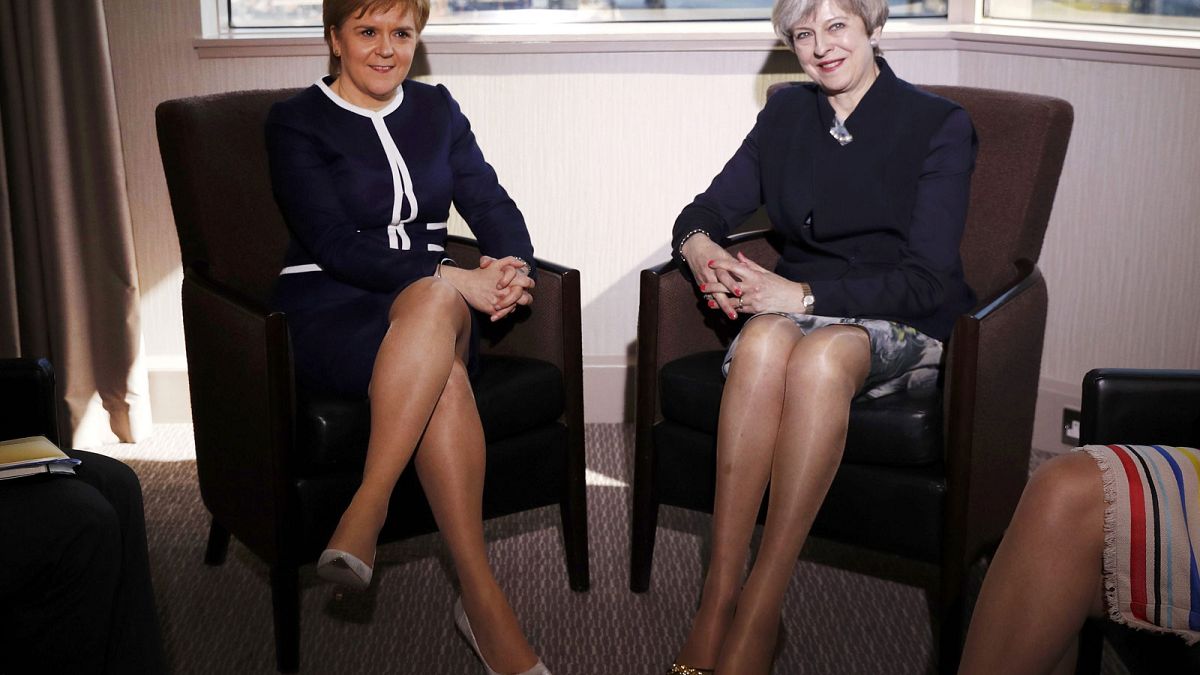Britain woke up to a bizarre headline in a national newspaper. Was it April 1st already?
Uncaffeinated eyes across Britain woke up to a bizarre headline in a national newspaper. Was it April 1st already? A quick check of the calendar revealed that ‘No’, this was in fact March 28th 2017, and that they were indeed staring at the front page talking about two human females’ lower limbs.
The women deciding the destiny of the United Kingdom held a meeting in Scotland. First Minister Nicola Sturgeon and Prime Minister Theresa May posed politely for a photo call. So far, nothing unusual, apart from talks about the potential break-up of a 300-year-old union in the continuing Brexit fallout.
But, the British tabloid’s choice of headline has resulted in a major backlash, or should we say, leglash against the paper.
‘Never mind Brexit, who won Legs-it’, will go down in history as one of the more unfortunate titles of the paper, already deemed an ‘unreliable’ source by Wikipedia.
Social media erupted with outrage under the hashtag #DailyFail.
Knew the clocks changed at the weekend but thought they went forwards an hour not back 70 years. #everydaysexism#legsitpic.twitter.com/CMG2eySyvK
— Daniel Fountain (@Daniel_Fountain) March 28, 2017
We're living in the most political unstable era of my lifetime, and the Daily Mail are writing sexist articles about our leader's legs. pic.twitter.com/54uAuAE9Sp
— Angry Salmond (@AngrySalmond) March 27, 2017
MPs also joined in the backlash.
It's 2017. This sexism must be consigned to history. Shame on the Daily Mail. pic.twitter.com/V3RpFSgfnO
— Jeremy Corbyn MP (@jeremycorbyn) March 27, 2017
Arguably two of most powerful people in UK discussing biggest issue of the day & Daily Mail talks about…their legs. What a rag #DailyFailpic.twitter.com/J9MqbziY5Q
— Humza Yousaf (@HumzaYousaf) March 27, 2017
Many lamented the misogyny saying ‘This is 2017’, and talking about ‘how far we have still to go to achieve gender equality’. Despite progress being made legally-speaking, inequality is written into our human societies spanning centuries. We can find the echoes of modern day misogyny in ancient times.
Prominent classics professor Mary Beard gave a lecture at the British Museum in 2014 entitled “Oh Do Shut Up Dear!” In it she cites one of the first examples of men silencing women in the public sphere in Homer’s Odyssey.
“The process starts in the first book with Penelope coming down from her private quarters into the great hall, to find a bard performing to throngs of her suitors; he’s singing about the difficulties the Greek heroes are having in reaching home. She isn’t amused, and in front of everyone she asks him to choose another, happier number. At which point young Telemachus intervenes: ‘Mother,’ he says, ‘go back up into your quarters, and take up your own work, the loom and the distaff … speech will be the business of men, all men, and of me most of all; for mine is the power in this household.’ And off she goes, back upstairs.”
She broadens her scope to talk about how women involved in politics pay a heavy price for being heard. She notes that women in the classical world were only allowed to speak when they were victims or if they were defending their homes, children, husbands or the interests of other women.
One of the most famous examples of a historical woman who had to disown her own sex in order to stir the troops was Elizabeth I. A speech, Beard notes, learned by many girls in school:
‘I know I have the body of a weak, feeble woman; but I have the heart and stomach of a king, and of a king of England too.’
A text that Elizabeth may never have spoken a word of, as the source material is unreliable. But the fact remains that this verse is part of the British cultural consciousness.
Bringing it towards the present, a BBC football commentator (Match of the Day’s first female commentator) has been on the receiving end of various hateful comments for daring to be a female broadcaster talking about football. This takes us into troll territory. Beard told the New Yorker in 2014 “It doesn’t much matter what line of argument you take as a woman. If you venture into traditional male territory, the abuse comes anyway. It’s not what you say that prompts it—it’s the fact that you are saying it.”
In a follow-up lecture about Women in Power: From Medusa to Merkel (published in the London Review of Books) she broadened the study of how culturally embedded our ideas of women in charge are. In it she argues our ‘template for a powerful person remains resolutely male’. She uses the example of cultural stereotypes of professions.
“I put the phrase ‘cartoon professor’ into Google Images – ‘cartoon professor’ to make sure that I was targeting the imaginary ones, the cultural template, not the real ones. Out of the first hundred that came up, only one, Professor Holly from Pokémon Farm, was female,” she said. And so she argues the template means female politicians must mimick in some form the male ideal. She takes the example of the trouser suit favoured by Hillary Clinton and Angela Merkel, saying they are a simple tactic to make the ‘female appear more male’.
So what can be done to untangle the idea of power in the psyche?
“You can’t easily fit women into a structure that is already coded as male; you have to change the structure. That means thinking about power differently. It means decoupling it from public prestige. It means thinking collaboratively, about the power of followers not just of leaders. It means above all thinking about power as an attribute or even a verb (‘to power’), not as a possession,” Beard argues.
Your questions about Brexit answered
